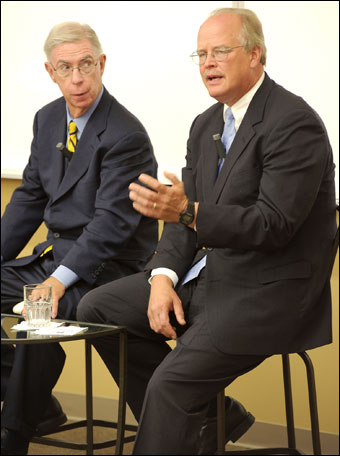Senators introduce legislation that would abolish Supreme Court elections
By: Jack Zemlicka, [email protected]//September 16, 2011//
Senators introduce legislation that would abolish Supreme Court elections
By: Jack Zemlicka, [email protected]//September 16, 2011//

Two state senators introduced legislation Thursday that would eliminate the election of state Supreme Court justices and replace that system with an appointment process based on merit.
The overhaul is proposed by Sens. Tim Cullen, D-Janesville, and Dale Schultz, R-Richland Center.
“It doesn’t take you very long if you look at what we’ve done in this state,” Schultz said during a Marquette Law School program Friday, “to realize that the elections that we have for justices are really more like a charade or mud-wrestling match.”
Legislators submitted the Joint Senate Resolution to the Senate Chief Clerk’s office, where it awaits a bill number. Then, it can be formally introduced sometime next week.
The proposal calls for the abolishment of elected justices, in favor of governor-appointed justices. The governor would make the 10-year term appointments with the advice and consent of the Senate.
The process would consist of the governor selecting a nominee from a list of five candidates recommended by an independent judicial selection commission, formed by the Legislature.
The same system also would apply to Wisconsin appellate court judges for six-year terms.
But some questioned the need Friday to abolish the election system and suggested fixing it might be a better solution.
Joe Syverson, executive board member of the Wisconsin Democracy Campaign, an election watchdog group, said the issue with isn’t whether there should be elections, but rather, how to eliminate the problem of outside money influencing their outcomes.
The senators’ proposal, he said, won’t remove politics from the process, only the voters.
“They don’t want to fix money in elections,” Syverson said. “They just want to get rid of elections all together. I think on principle that’s a bad idea.”
Previous proposals to curb third-party spending have failed in the past, which is why Schultz said it is time for something more extreme.
The legislature adopted the Impartial Justice Act, which provided public financing to incumbent Justice David Prosser and assistant attorney general JoAnne Kloppenburg in this year’s Supreme Court race.
But Gov. Scott Walker eliminated state money for the program and interest groups were still able to spend freely on the race.
Schultz said he is willing to consider proposals to fix the current system, but based on a lack of success in the past, he said he believes it is time for a different approach.
“If people want to pursue that and propose things, I think that’s great,” he said. “But I’ve been there and done that and it didn’t turn out the way Steve and I wanted it to.”
Both he and Cullen said the goal of the legislation is not to cut the public out of the process. Ideally, members of the public would be included on the selection committee and there could be a retention election held after the initial appointment term expires.
Switching to an appointment process won’t be easy, however, given that a shift away from elections requires a constitutional amendment approved through two successive sessions of the Legislature and then the voting public.
Still, Schultz said, he would like to see Wisconsin join 32 other states that have merit selection systems for judges, if for no other reason than to preserve the integrity of candidates.
“I’m wondering who in their right mind would put themselves through this,” Schultz said, “if they haven’t been a part of the process before. It has to be intimidating and people have to say, ‘I’m not going to do that to my good name or my family.’”
Legal News
- State Bar leaders remain deeply divided over special purpose trust
- Former Wisconsin college chancellor fired over porn career is fighting to keep his faculty post
- Pecker says he pledged to be Trump campaign’s ‘eyes and ears’ during 2016 race
- A conservative quest to limit diversity programs gains momentum in states
- Wisconsin prison inmate pleads not guilty to killing cellmate
- Waukesha man sentenced to 30 years for Sex Trafficking
- 12-year-old shot in Milwaukee Wednesday with ‘serious injuries’
- Milwaukee man convicted of laundering proceeds of business email compromise fraud schemes
- Giuliani, Meadows among 18 indicted in Arizona fake electors case
- Some State Bar diversity participants walk away from program
- Wisconsin court issues arrest warrant ‘in error’ for Minocqua Brewing owner
- Iranian nationals charged cyber campaign targeting U.S. Companies
WLJ People
- Power 30 Personal Injury Attorneys – Russell Nicolet
- Power 30 Personal Injury Attorneys – Benjamin Nicolet
- Power 30 Personal Injury Attorneys – Dustin T. Woehl
- Power 30 Personal Injury Attorneys – Katherine Metzger
- Power 30 Personal Injury Attorneys – Joseph Ryan
- Power 30 Personal Injury Attorneys – James M. Ryan
- Power 30 Personal Injury Attorneys – Dana Wachs
- Power 30 Personal Injury Attorneys – Mark L. Thomsen
- Power 30 Personal Injury Attorneys – Matthew Lein
- Power 30 Personal Injury Attorneys – Jeffrey A. Pitman
- Power 30 Personal Injury Attorneys – William Pemberton
- Power 30 Personal Injury Attorneys – Howard S. Sicula











